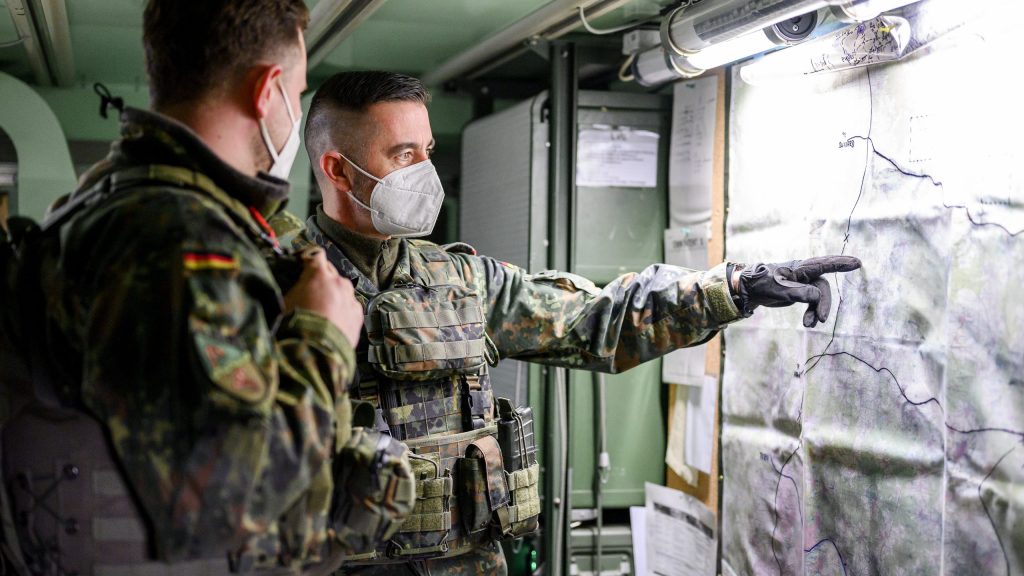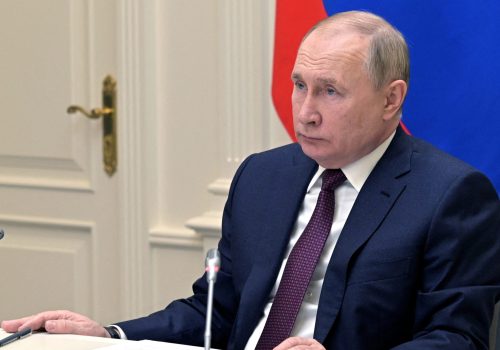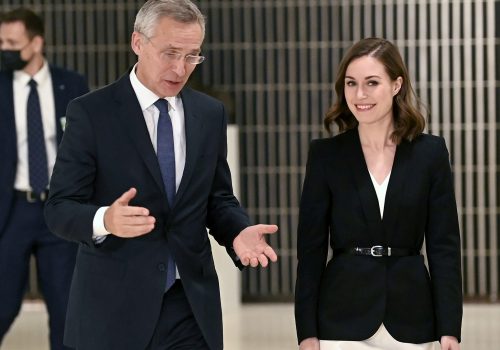This post is adapted from remarks delivered by Chair of the NATO Military Committee Adm. Rob Bauer at an Atlantic Council roundtable on February 28.
Peace on the European continent has been shattered. Over the last four days, we have witnessed a full-fledged attack on the Ukrainian armed forces and the Ukrainian people.
Relentless in its carnage and destruction, Russia is trying to destroy the force of law with the law of force. It is crystal clear that this conflict is bigger than Ukraine. This is about how we live together on this planet and how we solve our differences.
Here at NATO headquarters in Brussels, all our efforts are geared toward protecting and defending the one billion people who live on allied soil—protecting our freedom and our democracy.
Last week, the North Atlantic Council held Article 4 consultations, and allies have decided to take additional steps to further strengthen deterrence and defense:
- The United States, Canada, and the European allies have deployed significant reinforcements.
- We have activated response plans that increase the readiness and the preparedness of our forces and our ability to deploy our forces on a very short notice.
- We are now employing elements of the NATO Response Force. For the first time, the Alliance has employed these high-readiness forces in a deterrence and defense role.
- And across the board, we have sped up political and military decision making.
Our measures are preventive, proportionate, and non-escalatory.
In addition, individual allies are pledging more and more weapons and support to Ukraine. And in Germany last weekend, a historic decision was made to immensely increase the defense budget.
This the start of a new era. It is the biggest security crisis of my career, but at the same time I have never been prouder to serve this Alliance. Both on a political and on a military level we are closer than ever, readier than ever.
Each day, I see with my own eyes the immense scale and strength of this organization. In the end, that is what deterrence is about. Deterrence is the seven-foot-tall bouncer in front of the nightclub who makes you think twice about whether you want to force yourself in. It is about having the political will and the military capabilities to be credible and act decisively when necessary. Because when armed conflict inevitably presents itself, coming in second is not the preferred option.
Under the democratic rule of law that we fight so hard to protect, there is a crucial division of power and responsibility. The political level decides on the “why” and the “what.” And the military level is responsible for the “how.”
The NATO Military Committee has an important role to play in this because we are the essential link between the political decision-making process and the military structure of NATO. Twice a week, the Military Committee gathers to generate unfettered, consensus-based advice to the North Atlantic Council and the Nuclear Planning Group.
Two elements are crucial here: unfettered and consensus-based. Unfettered means that the advice only pertains to what is feasible, not to what is politically desirable. And consensus-based means that the right to say “no” to a proposal is always tied to the obligation to find a “yes”—an alternative solution.
Finding consensus at thirty allies is hard. This organization is not perfect. But at the end of the day, this is the only place in the world where both the political and the military level get together on a daily basis to discuss what they can do and not what they can’t do.
In the Military Committee, we have thirty allied chiefs of defense (or their representatives) around the table, all of whom take a 360-degree approach to security. We are constantly thinking of how we can best deploy the 3.2 million men and women in uniform who serve this Alliance—3.2 million men and women who are willing to put it all on the line to protect our democracy.
I have every faith that we have what it takes to make sure that freedom wins over oppression. That’s because within this Alliance, we are able to draw strength from diversity, to learn from other points of view.
And that is why we are always open to honest discussions and debates about this security crisis as it unfolds. Such debates are critical to open societies—and they are what separate us from our adversaries.
Adm. Rob Bauer, of the Royal Netherlands Navy, is the chair of the NATO Military Committee.
Further reading
Fri, Mar 4, 2022
To decipher Putin’s nuclear threats, watch what he does—not what he says
New Atlanticist By Matthew Kroenig, Mark J. Massa, Alyxandra Marine
For years, Moscow has made nuclear weapons a centerpiece of its military doctrine. The West must not capitulate.
Thu, Mar 3, 2022
Will Finland and Sweden join NATO now?
New Atlanticist By Anna Wieslander, Christopher Skaluba
Russia's invasion of Ukraine has shifted the political dynamics in the two militarily non-aligned Nordic states. Here's how a fast-track NATO process could look.
Thu, Mar 3, 2022
Europe needs to prepare for a future without Russian energy
New Atlanticist By
One of Putin’s greatest assets is Western reliance on Russia; to move forward, this relationship must shift from one of necessity to one of convenience.
Image: Two German soldiers sift through a map during an exercise of a simulated battle on the computer for the NATO task force at the Army's Battle Simulation Center in Wildflecken, Germany, on March 7, 2022. Photo by Daniel Vogl/dpa via REUTERS



